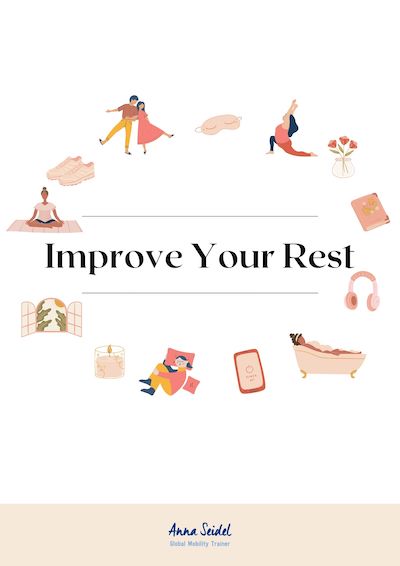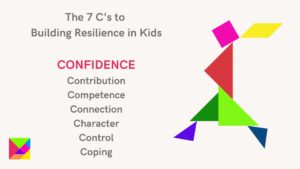Do you berate yourself for not going to bed on time?
While 7-8 hours of sleep a night are ideal, maybe that isn’t the sole source of your exhaustion. Especially if you wake up feeling just as tired and worn out as before.
While sleep is incredibly important as a form of rest you might be surprised that it is only one of 7 types of rest identified by Dr. Saundra Dalton-Smith. Listen to her on TED here.
That’s right – SEVEN different types of rest to truly feel “well rested” and energized.
Her research really resonated with me so I wanted to share it with you. A greater awareness of the types of rest we need, how to get them and working on actually getting rest can lead to more wellbeing.
I’ve summarized Dr. Dalton-Smith’s research and a number of other resources I found. Each form of rest is described along with ways to increase it. I’ve also created a workbook for you to use to feel more rested.
Keep in mind that exhaustion can be associated with health problems so if it persists, please speak to a health professional.
Physical Rest
 This is rest for your body. Recovery time for physical regeneration. Signs you need more physical rest are a lack of energy to make it through the day and feeling physically depleted.
This is rest for your body. Recovery time for physical regeneration. Signs you need more physical rest are a lack of energy to make it through the day and feeling physically depleted.
There are two types of physical rest that everyone needs:
Passive: sleeping/napping (can be very effective). Follow a sound sleep protocol to wind down before bed every night.
Active: meditation, yoga, stretching, massage – anything to restore the body.
Mental Rest
 If you are feeling irritable and like you can’t switch off at night, you might have a mental rest deficit. Brain fog and anxious “what-if” cycles are other signs you need to increase this form of rest.
If you are feeling irritable and like you can’t switch off at night, you might have a mental rest deficit. Brain fog and anxious “what-if” cycles are other signs you need to increase this form of rest.
Ways to get more mental rest include scheduling breaks during the day (e.g. every 2 hours. Set a timer on your phone and actually get up and move), get outside, stretch, let your mind drift.
To help you get to sleep better keep a notepad by your bed to jot down the thoughts that are keeping you awake.
More realistic time management can also improve rest. When scheduling something, consider the time needed before and after an activity. Preparing to call your tax consultant will take more preparation than calling to make a doctors’ appointment.
Sensory Rest
 Our senses can only take so much before we become irritated and overstimulated. We sometimes recognize this in our babies and children – why not in ourselves? Look around you – how many lights are on? How many screens are in sight? What sounds are you hearing? Kids whining? Traffic? Conversations or TV in the background? Have your kids been all over you all day? Are your clothes uncomfortable? Masks on for hours a day?
Our senses can only take so much before we become irritated and overstimulated. We sometimes recognize this in our babies and children – why not in ourselves? Look around you – how many lights are on? How many screens are in sight? What sounds are you hearing? Kids whining? Traffic? Conversations or TV in the background? Have your kids been all over you all day? Are your clothes uncomfortable? Masks on for hours a day?
These many stimuli can lead to sensory overload, which in turn can make us irritable. The point at which the occurs is very individual but we all get there eventually.
Get your sensory rest by intentionally unplugging electronics or by creating a space with low sensory input. For example, have a space in your house that you find beautiful & calm, use noise cancelling headphones, let your family know that “Mommy needs a time out”, or eat something nourishing.
don't miss the next tip
sign up for "A little something" every week
WordPress – Global Mobility Trainer
Creative Rest

Creative rest is about exposing yourself to artistic, nature-based, and innovative environments without feeling the need to produce a creation—and feeling the sense of inspiration that comes along with this exposure. It isn’t necessarily about being creative.
Signs you need more creative rest are feeling stuck, lacking creativity and inspiration and being just plain out of ideas.
Creative rest awakens a sense of awe and wonder; it sparks inventiveness and gets our problem solving juices flowing.
Getting creative rest is a simple as stepping outside and taking in the beauty and wonder outdoors. Walk with no destination – no phone, no music, no dog, no conversation. Enjoy the arts – look long and hard at one picture in a museum or photo book, read a poem slowly line-by-line, listen to music without distractions. Decorate your space, make your meals look attractive, keep your car clean, take extra time on your make-up, journal (check out Morning Pages). Be creative yourself by finding a passion and integrating it every day.
The key here is to remove the requirement to produce. Rather dive into activities that inspire you and let you forget what is going on around you.
Emotional Rest
 Do you feel unappreciated? Taken advantage of? Like you say “yes” more often than you’d like? Do you beat yourself up for mistakes, have feelings of self-doubt and worry all the time?
Do you feel unappreciated? Taken advantage of? Like you say “yes” more often than you’d like? Do you beat yourself up for mistakes, have feelings of self-doubt and worry all the time?
Increasing your emotional rest may be instrumental in restoring your equilibrium.
You can do this by creating spaces and times where you can freely express your feelings. Identify your preferences (boundaries) and practise saying them out loud. You can start simply by replacing “yes” with “I need to think about it”. Also be mindful of your environment and media consumption. Emotions are “contagious” so be aware of who you spend time with and work to put an end to social comparisons as they can be so demotivating.
Actively look for opportunities to be YOU and express yourself openly and honestly. Increased contact with things you find emotionally restoring will improve your overall wellbeing – and rest.
I really enjoyed this post on Well Women Beijing about boundaries.
Social Rest
 Social rest is fascinating to me – more than any other form of rest it reflects our personalities and preferences. Increasing social rest can mean diving into more meaningful social interactions for some, while for others it means getting as far away from people as possible.
Social rest is fascinating to me – more than any other form of rest it reflects our personalities and preferences. Increasing social rest can mean diving into more meaningful social interactions for some, while for others it means getting as far away from people as possible.
However you fill your need, signs of a social rest deficit include feeling drained and emotionally exhausted, feeling alone, feeling detached or being attached to unhealthy relationships.
Get more social rest by first identifying what your needs are and then surrounding yourself with positive, uplifting supportive people. Make a list of people in your life that fit this description and then make time to be with them – online or offline.
If you need a break from humans to get your social rest, communicate this to people around you and then retreat to your cave to recharge.
Spritual Rest
 Spiritual rest is about connecting with “something” bigger & more all-encompassing than yourself.
Spiritual rest is about connecting with “something” bigger & more all-encompassing than yourself.
Signs of a spiritual rest deficit are feeling a lack of belonging, purpose and/or connection. Being caught up in issues and unable to see the big picture – stuck in a “mouse-eye” view of life – are further indications you may need to increase your spiritual rest.
Getting spiritual rest means stepping outside of what you are currently doing and becoming part of something, working towards a shared goal, for example by getting involved in a meaningful (to you!) project in your work or private life. Community involvement, volunteering and mentoring others are just some further examples. Prayer and meditation are other ways to fulfil your spiritual rest needs.
Next Steps
Identify what forms of rest you are lacking (hint: start with those that feel hardest) and then find ways to incorporate rest into your days. Every day. Finding ways to recharge & replenish before your battery is dead means you will be able to go for longer and feel better doing it.
If you would like some help with this, I’ve created a workbook for you. It uses a tried & true method to identify your rest deficits and helps you take steps towards improving your rest needs right away. Included in the purchase price is one follow up email from me – to check in, ask questions or get accountability.
Workbook: Improve Your Rest
I’ve created a resource to help you get more rest, feel better and be more energised.
The Improve Your Rest Workbook helps you
- identify what kinds of rest you’re lacking
- choose what actions to take to increase rest
This proven tool is easy to use and includes one follow up support email from me. All for just 6€.
Click this button to get your copy:
References:
purewow
trello
quickanddirtytips







Pingback: 2021 - A year for health and connection - Trainer, Coach & Mentor for Global Women and Families
Pingback: 7 Rewarding (Expat) Life Lessons I Learned from Running